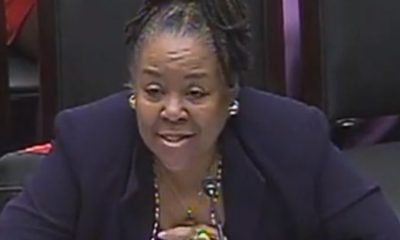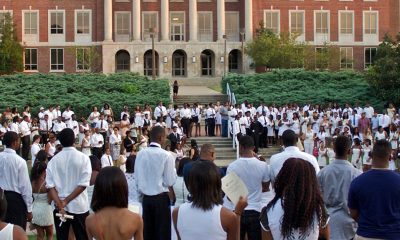Black History
‘Clotilda,’ the last known slave ship to arrive in the U.S., is found
SOUTH FLORIDA TIMES — Last year, the Smithsonian’s National Museum of African American History and Culture’s Slave Wrecks Project (SWP) joined the effort to help involve the community of Africatown in the preservation of the history, explains Smithsonian curator and SWP co-director Paul Gardullo.
By Allison Keyes
One hundred and fifty-nine years ago, MOBILE, Ala. – Once slave traders stole Lorna Gail Woods’ great great grandfather from what is now Benin in West Africa.
Her ancestor, Charlie Lewis, was brutally ripped from his homeland, along with 109 other Africans, and brought to Alabama on the Clotilda, the last known slave ship to arrive in the United States. Today, elusive for decades, have been found along the Mobile River, near 12 Mile Island and just north of the Mobile Bay delta.
“The excitement and joy is researchers confirmed that the remains of that vessel, long rumored to exist but overwhelming,”says Woods, in a voice trembling with emotion. She is 70 years old now. But she’s been hearing stories about her family history and the ship that tore them from their homeland since she was a child in Africatown, a small community just north of Mobile founded by the Clotilda’s survivors after the Civil War.
The authentication and confirmation of the Clotilda was led by the Alabama Historical Commission and SEARCH Inc., a group of maritime archaeologists and divers who specialize in historic shipwrecks.
Last year, the Smithsonian’s National Museum of African American History and Culture’s Slave Wrecks Project (SWP) joined the effort to help involve the community of Africatown in the preservation of the history, explains Smithsonian curator and SWP co-director Paul Gardullo.
Two years ago, Gardullo says talks began about mounting a search for the Clotilda based on conversations with the descendants of the founders of Africatown. Then last year, it seemed that Ben Raines, a reporter with AL.com had found the Clotilda, but that wreck turned out to be too large to be the missing ship. Gardullo says everyone involved got moving on several fronts to deal with a complicated archaeological search process to find the real Clotilda.
“This was a search not only for a ship. This was a search to find our history and this was a search for identity, and this was a search for justice,” Gardullo explains. “This is a way of restoring truth to a story that is too often papered over. Africatown is a community that is economically blighted and there are reasons for that. Justice can involve recognition. Justice can involve things like hard, truthful talk about repair and reconciliation.”
Even though the U.S. banned the importation of the enslaved from Africa in 1808, the high demand for slave labor from the booming cotton trade encouraged Alabama plantation owners like Timothy Meaher to risk illegal slave runs to Africa.
Meaher took that risk on a bet that he could bring a shipload of Africans back across the ocean. In 1860, his schooner sailed from Mobile to what was then the Kingdom of Dahomey under Captain William Foster. He bought Africans captured by warring tribes back to Alabama, skulking into Mobile Bay under the cover of night, then up the Mobile River. Some of the transported enslaved were divided between Foster and the Meahers, and others were sold. Foster then ordered the Clotilda taken upstream, burned and sunk to conceal the evidence of their illegal activity.
After being freed by Union soldiers in 1865, the Clotilda’s survivors sought to return to Africa, but they didn’t have enough money. They pooled wages they earned from selling vegetables and working in fields and mills to purchase land from the Meaher family. Calling their new settlement Africatown, they formed a society rooted in their beloved homeland, complete with a chief, a system of laws, churches and a school. Woods is among the descendants who still live there. Finally, she says, the stories of their ancestors were proved true and now have been vindicated.
“So many people along the way didn’t think that happened because we didn’t have proof. By this ship being found we have the proof that we need to say this is the ship that they were on and their spirits are in this ship,” Woods says proudly. “No matter what you take away from us now, this is proof for the people who lived and died and didn’t know it would ever be found.”
The museum’s founding director, Lonnie Bunch, says the discovery of The Clotilda tells a unique story about how pervasive the slave trade was even into the dawn of the Civil War.
“One of the things that’s so powerful about this is by showing that the slave trade went later than most people think, it talks about how central slavery was to America’s economic growth and also to America’s identity,” Bunch says. “For me, this is a positive because it puts a human face on one of the most important aspects of African American and American history. The fact that you have those descendants in that town who can tell stories and share memories – suddenly it is real.”
Curators and researchers have been in conversation with the descendants of the Clotilda survivors to make sure that the scientific authentication of the ship also involved community engagement.
Smithsonian curator Mary Elliott spent time in Africatown visiting with churches and young members of the community and says the legacy of slavery and racism has made a tangible footprint here in this place across a bridge from downtown Mobile. In a neighborhood called Lewis Quarters, Elliott says what used to be a spacious residential neighborhood near a creek is now comprised of a few isolated homes encroached upon by a highway and various industries.
“What’s powerful about Africatown is the history. What’s powerful about it is the culture. What’s powerful about it is the heritage stewardship, that so many people have held onto this history, and tried to maintain it within the landscape as best they could,” Elliott says. “But it also shows the legacies of slavery. You see environmental racism. You see where there’s blight and not necessarily because the residents didn’t care; but due to a lack of resources, which is often the case for historic black communities across the country. When people drive through that landscape, they should have a better sense of the power of place, how to read the land and connect to the history.”
There are no photographs of the site where the Clotilda was found or of the wreck itself. “[The ship] wasn’t very deep.
Eight to ten feet at most,” Sadiki recalls. “But the conditions are sort of treacherous. Visibility was almost zero and there’s some current, but the most important thing is that you’re among wreckage that you cannot see. There’s a whole host of possibilities to being injured, from being impaled, to getting snagged and so forth.”
We call our village Affican Town. We say dat ‘cause we want to go back in de Affica soil and we see we cain go. Derefo’ we makee de Affica where dey fetch us.
Activism
Oakland Post: Week of May 1 – 7, 2024
The printed Weekly Edition of the Oakland Post: Week of May 1 – 7, 2024

To enlarge your view of this issue, use the slider, magnifying glass icon or full page icon in the lower right corner of the browser window. ![]()
Activism
Oakland Post: Week of April 24 – 30, 2024
The printed Weekly Edition of the Oakland Post: Week of April 24 – 30, 2024

To enlarge your view of this issue, use the slider, magnifying glass icon or full page icon in the lower right corner of the browser window. ![]()
Activism
Oakland Post: Week of April 17 – 23, 2024
The printed Weekly Edition of the Oakland Post: Week of April 17 – 23, 2024

To enlarge your view of this issue, use the slider, magnifying glass icon or full page icon in the lower right corner of the browser window. ![]()
-

 Community2 weeks ago
Community2 weeks agoFinancial Assistance Bill for Descendants of Enslaved Persons to Help Them Purchase, Own, or Maintain a Home
-

 Activism4 weeks ago
Activism4 weeks agoOakland Post: Week of April 3 – 6, 2024
-

 Business2 weeks ago
Business2 weeks agoV.P. Kamala Harris: Americans With Criminal Records Will Soon Be Eligible for SBA Loans
-

 Community2 weeks ago
Community2 weeks agoAG Bonta Says Oakland School Leaders Should Comply with State Laws to Avoid ‘Disparate Harm’ When Closing or Merging Schools
-

 Activism3 weeks ago
Activism3 weeks agoOakland Post: Week of April 10 – 16, 2024
-

 Community2 weeks ago
Community2 weeks agoOakland WNBA Player to be Inducted Into Hall of Fame
-

 Community2 weeks ago
Community2 weeks agoRichmond Nonprofit Helps Ex-Felons Get Back on Their Feet
-

 Community2 weeks ago
Community2 weeks agoRPAL to Rename Technology Center for Retired Police Captain Arthur Lee Johnson





















































